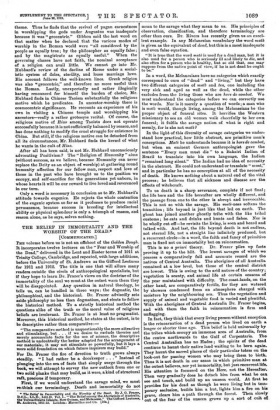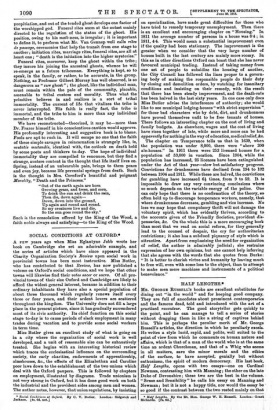THE BELIEF IN IMMORTALITY AND THE WORSHIP OF THE DEAD.*
[COMMUNICATED.]
THE volume before us is not an offshoot of the Golden Bough. It incorporates twelve lectures on the " Fear and Worship of
the Dead," delivered in the Lent and Easter terms of 1911 at Trinity College, Cambridge, and repeated, with large additions, before the University of St. Andrews as the Gifford Lectures for 1911 and 1912. The title is one that will allure many readers outside the circle of anthropological specialists, but if they hope to learn Dr. Frazer's views on the doctrine of the immortality of the soul we must at the outset warn them they will be disappointed. Any question in natural theology, he tells us, can be handled in three ways : the dogmatic, the philosophical, and the historicaL Dr. Frazer advisedly sets aside philosophy no less than dogmatism, and elects to follow the historical method. To a strictly historical method the questions alike of the truth or the moral value of religious beliefs are irrelevant. Dr. Frazer is at least no pragmatist. Moreover, this historical method, he states at the outset, is to be descriptive rather than comparative :—
" The comparative method is unquestionably the more attractive and stimulating, but . . . if we desire to exclude theories and merely accumulate facts for the use of science, the descriptive method is undoubtedly the better adapted for the arrangement of our materials; it may not stimulate so powerfully, but it lays a more solid foundation on which future inquirers may build."
For Dr. Frazer the fire of devotion to truth grows always steadily. " I had rather be a doorkeeper . . " Instead of plunging into the sea of facts that simply surge through the book, we will attempt to survey the new outlook from one or two solid planks that may build, as it were, a kind of structural raft, precious if temporary.
First, if we would understand the savage mind, we must re-think our terminology. Death and immortality do not
• The Belief its Immortality and the Worship of the Dead. By J. G. Frazer, D.C.L., LL.D., Litt.D. Vol. I., " The Belief among the Aborigines of Australia, the Torres Straits Island'', New Guinea, and Melanesia." The Gifford Lectures, Bt. Andrews, 1911.12. London; Macmillan and Co. [10s.„I mean to the savage what they mean to us. His principles of observation, classification, and therefore terminology are other than ours. Dr. Rivers has recently given us an excel- lent example. In any Melanesian vocabulary the word mate is given as the equivalent of dead, but this is a most inadequate and even false equation.
"It is true that the word mate is used for a dead man, but it is also used for a person who is seriously ill and likely to die, and also often for a person who is healthy, but so old that, one may suppose from the native point of view, if he is not dead he ought to be."
In a word, the Melanesians have no categories which exactly correspond to ours of " dead " and "living," but they have two different categories of mate and tea, one including the very sick and aged as well as the dead, while the other excludes from the living those who are hors de combat. Wo must understand the categories before we can correctly use the words. Nor is it merely a question of words; a man who is mate would, though living, among the Melanesians be the
proper object of funeral rites. It horrifies the Western missionary to see an old woman walk cheerfully to her own funeral; it fulfils the savage notion of what is right and seemly, for is she not mate ?
In the light of this diversity of savage categories we under- stand how practical, how little abstract, are primitive man's conceptions. Mate he understands because it is hors de combat, but when an eminent German anthropologist gave the sentence "Every man must die " to a Bakairi Indian of Brazil to translate into his own language, the Indian "remained long silent." The Indian had no idea of necessity in the abstract. He could not understand or translate " must," and in particular he has no conception at all of the necessity of death. He knows nothing about a natural end of the vital process; he believes that all sickness and disease are the effects of witchcraft.
To us death is a sharp severance, complete if not final ; the life here and the life hereafter are wholly different, and the passage from one to the other is abrupt and irrevocable.
This is not so with the savage. His mate-ness softens the transition ; life beyond is just like that led on earth. The ghost has joined another ghostly tribe with the like tribal customs ; he eats and drinks and hunts and fishes. Nor is he wholly cut off—he revisits the living, is seen and heard and talked with. And last, the life beyond death is not endless, not eternal life, not a straight line infinitely produced, but a recurrent circle—in a word, the faith and fancy of primitive man is fixed not on immortality but on reincarnation.
This is no a priori theory. Dr. Frazer piles up facts proving it up to the hilt. The lowest savages of which we possess a comparatively full and accurate record are the natives of Central Australia. The aborigines of all Australia remained at a low level, but those of the central district are lowest. This is owing to the arid nature of the country ; vegetation is scanty, and animal life at certain seasons of the year maintained with difficulty. The coast-lands, on the
other hand, are comparatively fertile, for they are watered
by showers condensed from an atmosphere charged with moisture by the neighbouring sea. Thus the vegetation and supply of animal and vegetable food is varied and plentiful. With the aborigines of Central Australia Dr. Frazer begins, and with them the faith in reincarnation is firm and unflagging. In fact, they think that every living person without exception is the reincarnation of a dead person who lived on earth a longer or shorter time ago. This belief is held universally by the tribes which occupy an immense area of Australia, from the centre northwards to the Gulf of Carpentaria. The Central Australian has no Hades ; the spirits of the dead
continue to haunt their native land waiting to be born again. They haunt the sacred places of their particular totem on the
look-out for passing women who may bring them to birth. Thus it is not death in our sense in which primitive man at the outset believes, nor yet immortality, but just recurrent life.
His attention is focussed on the Here, not the Hereafter.
Then very gradually does he detach him from what be can see and touch, and build up an unseen world. At first he provides for his dead as though he were living but in thin- porary seclusion, builds him a hut, lights him a fire on his grave, clears him a path through the forest. Then slowly out of the fear of the unseen grows up a sort of cult of
propitiation, and out of the tended ghost develops one factor of the worshipped god. Funeral rites seem at the outset mainly
directed to the regulation of the status of the ghost. His position, owing to his mate-ness, is irregular ; it is important to define it, to perform what Mr. Van Gennep well calls rites de passage, ceremonies that help the transit from one stage to
another ; initiation rites, marriage rites, funeral rites, are all at heart one ; " death is the initiation into the higher mysteries."
Funeral rites, moreover, keep the ghost within the tribe ; they insure his joining the ancestral ghosts, whence be will re-emerge as a future tribesman. Everything is kept, so to speak, in the family, or rather, to be accurate, in the group. Nothing, as Professor Gilbert Murray has well observed, is so
dangerous as " raw ghost "; the ghost, like the individual man, must remain within the pale of the community, placable,
amenable to tribal custom and morality. Thus what the primitive believes in and realizes is a sort of tribal immortality. The current of life that vitalizes the tribe is never interrupted. His faith is really fact, the tribe is immortal, and the tribe to him is more than any individual
member of the tribe.
We have reconstructed—theorized, it may be—more than Dr. Frazer himself in his conscientious caution would approve. His profoundly interesting and suggestive book is to blame. Fools are apt to rush in. It will escape no one that the faith
of these simple savages in reincarnation is strangely like, is, mutatis mutandis, identical with, the outlook on death held by some poets and thinkers to-day. The hope of individual immortality they are compelled to renounce, but they find a strange, austere content in the thought that life itself lives on.
Spring, instead of an unbearable pain, brings to them peace and even joy, because life perennial springs from death. Such
is the thought in Mrs. Cornford's beautiful and poignant Morality, "Death and the Princess."
"Out of the earth again are born
Growing grass, and trees, and corn, To drink the sun and drink the rain,
Then die, down again—
Down, down into the ground, Up again and round and round. So my creatures live and die, So the sun goes round the sky."
Such is the consolation offered by the King of the Wood, a faith noble always and satisfying—to the King of the Wood.



























































 Previous page
Previous page